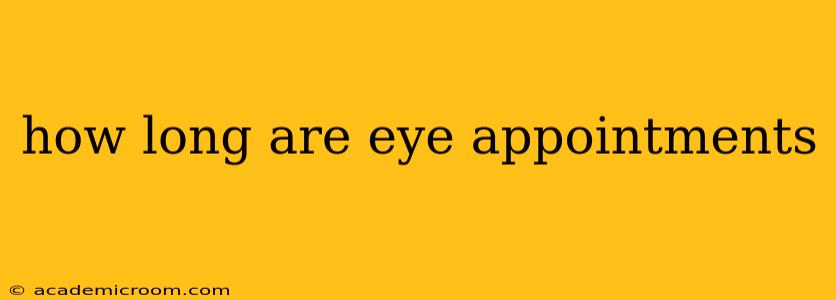The length of an eye appointment can vary significantly depending on several factors. There's no one-size-fits-all answer, but understanding what influences appointment duration helps you manage your expectations and plan your day accordingly. This guide breaks down the typical timeframe for various types of eye exams and what to expect during your visit.
What Factors Determine the Length of an Eye Appointment?
Several key factors influence how long your eye appointment will take:
- Type of Exam: A routine eye exam for a healthy adult will generally be shorter than a comprehensive dilated eye exam or one addressing a specific eye condition.
- Reason for the Visit: Are you experiencing symptoms like blurry vision, headaches, or eye pain? These require more in-depth investigation, extending the appointment time.
- Doctor's Approach: Each ophthalmologist or optometrist has their own examination style and pace.
- Patient Needs: Some patients require more time for explanation or answering questions. The doctor will adjust the appointment length accordingly.
- Technology Used: The use of advanced diagnostic equipment can influence appointment length.
Typical Appointment Durations:
Here's a breakdown of approximate durations for different types of eye appointments:
-
Routine Eye Exam (Comprehensive): This usually takes between 45 minutes to an hour. This involves a visual acuity test, refraction (to determine your prescription), examination of your eye structures, and discussion of your eye health.
-
Routine Eye Exam (Basic): A more basic check-up focusing solely on vision correction might take around 30 minutes.
-
Dilated Eye Exam: This exam involves dilating your pupils to allow the doctor a better view of the inner structures of your eyes. This process adds significant time, typically extending the appointment to 1-1.5 hours. It's crucial for detecting conditions like glaucoma and macular degeneration.
-
Follow-up Appointment: If you are undergoing treatment for a specific eye condition, follow-up appointments are usually shorter, ranging from 15 to 30 minutes. This allows the doctor to monitor progress and make necessary adjustments.
-
Specialized Appointments: Appointments for specific procedures or conditions, like cataract surgery consultations, can last significantly longer. Expect these to take an hour or more, sometimes exceeding two hours.
How Long Should I Expect to Wait?
While the actual exam time varies, it's important to factor in potential wait times at the clinic or office. Being mindful of possible delays is key to managing your schedule effectively. Consider adding an extra 15-30 minutes to your estimated appointment time to account for potential wait times before and after your exam.
What Happens During an Eye Appointment?
A typical comprehensive eye exam usually includes:
- Visual Acuity Test: This assesses your ability to see at various distances.
- Refraction: This determines the power of lenses needed to correct your vision.
- Eye Structure Examination: This checks for any abnormalities in the eye's structures.
- Intraocular Pressure Check: This measures the pressure inside your eye, important for detecting glaucoma.
- Eye Health Discussion: Your doctor will discuss any concerns, provide recommendations and answer your questions.
What if My Appointment Takes Longer Than Expected?
If your appointment is running longer than anticipated, don't hesitate to ask your doctor or the clinic staff about the expected remaining time. Open communication ensures better time management for both parties.
Conclusion:
The length of your eye appointment depends on various factors. While a routine exam might take around an hour, dilated exams and appointments for specific conditions can be significantly longer. Planning ahead and understanding the potential time commitment will ensure a smoother and more productive experience. Remember to always communicate with your eye care professional if you have any questions or concerns.
